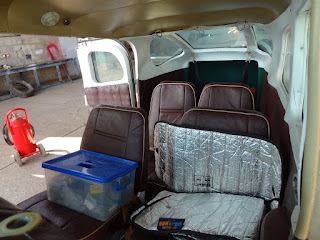26 February 2012
 |
| Juicing up, power's on |
The one thing for certain here is the uncertainty of things when you are trying to plan an event, like trying to communicate on a regular basis. Power is, as we knew, the limiting factor to communications. The town actually does get some electricity, but it is rationed to about two hours every other night and that is not on a solid schedule. When the power is not “scheduled to be on”, Jacques runs his small generator IF he has been able to find petrol available in the town. And we thought it was bad or tough in Zimbabwe – Not! Of course it was tough conditions there, but it is far worse here in everyday living conditions.
 |
| Dining room petrol |
Jacques say we might be going “up country” by the end of next week with a trip to the three main UMC Missions, each of which has a UMC hospital. The first leg of the trip will be a 90 minutes flight with a landing on a grass field. Not unusual as most of the fields Jacques flies into and out of are grass. We will visit one of the Missions, and then fly over to another one where we will spend two nights. The second day will be spent going to Church and then touring the second facility. The third day will be another flight and visit at the last facility and probably a return flight to Kananga. Our main purpose for making the trips is to provide UMC Global Health with another set of eyes on potential projects and needs Travel times and distances, absolutely requiring the use of the small planes, is drastically impacted by the price and availability of aviation fuel for the small planes. We have three, 55 gallon drums of the stuff sitting in the dining room of the cottage we are staying in right now. This is Jacques’ emergency supply in case he needs to either leave the area for whatever reason or make an emergency trip to pick up a patient for a special trip to one of the hospitals or ferry the Bishop to some important meeting or gathering. At almost $1100 per drum, the stuff is like gold.
 |
| One of several church music groups |
This morning we attended the local UMC church which is located directly across the street from the cottage and compound where we are staying. Actually, we got a preview of the hymns, with African drum accompaniment, last night as we lay in our beds listening to the groups practicing until well after midnight. Even with ear plugs, you are lulled to sleep by drums and familiar tunes, sung in youthful French. The service is primarily for youth and young adults, several of which attend the university here or are in law school. Jacques adopted daughter, Virginie, is going to law school after finishing her college.
 |
| Kananga street |
One interesting fact about Kananga – well, actually a series of facts. The city is the third largest, has almost 1 million people and only has 3 gas stations… Jacques estimates there are only around 150 to 200 workable cars, with more trucks and lots of motorbikes. The UN has a fairly large contingent here and their vehicles do not count in Jacques total. Amazing… lots of people walking as there are not many buses.
We do not have power tonight. Jacques was not able to find any petrol as all three stations had run out and the tanker trucks had not gotten through from Kinshasa. Maybe tomorrow.













































